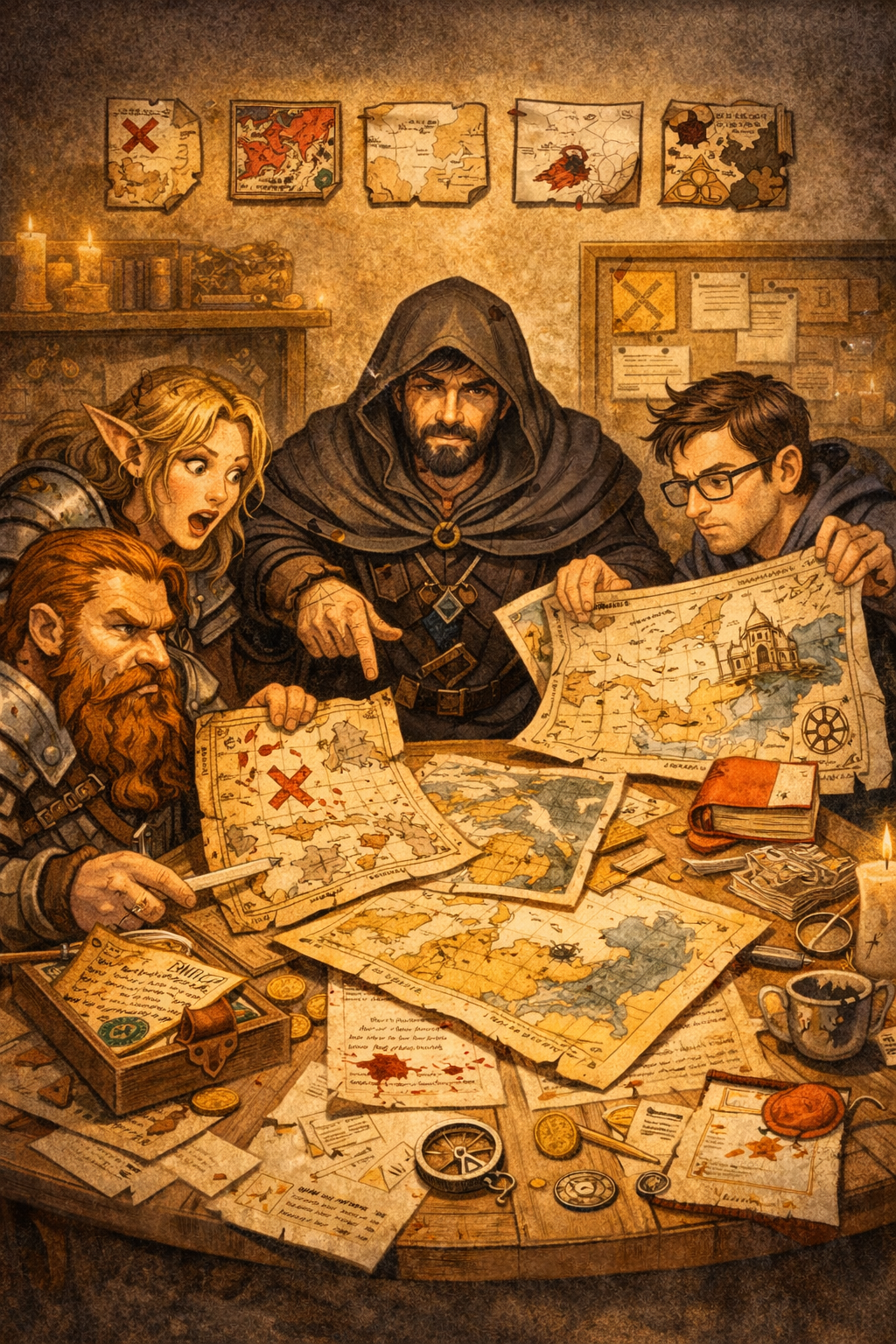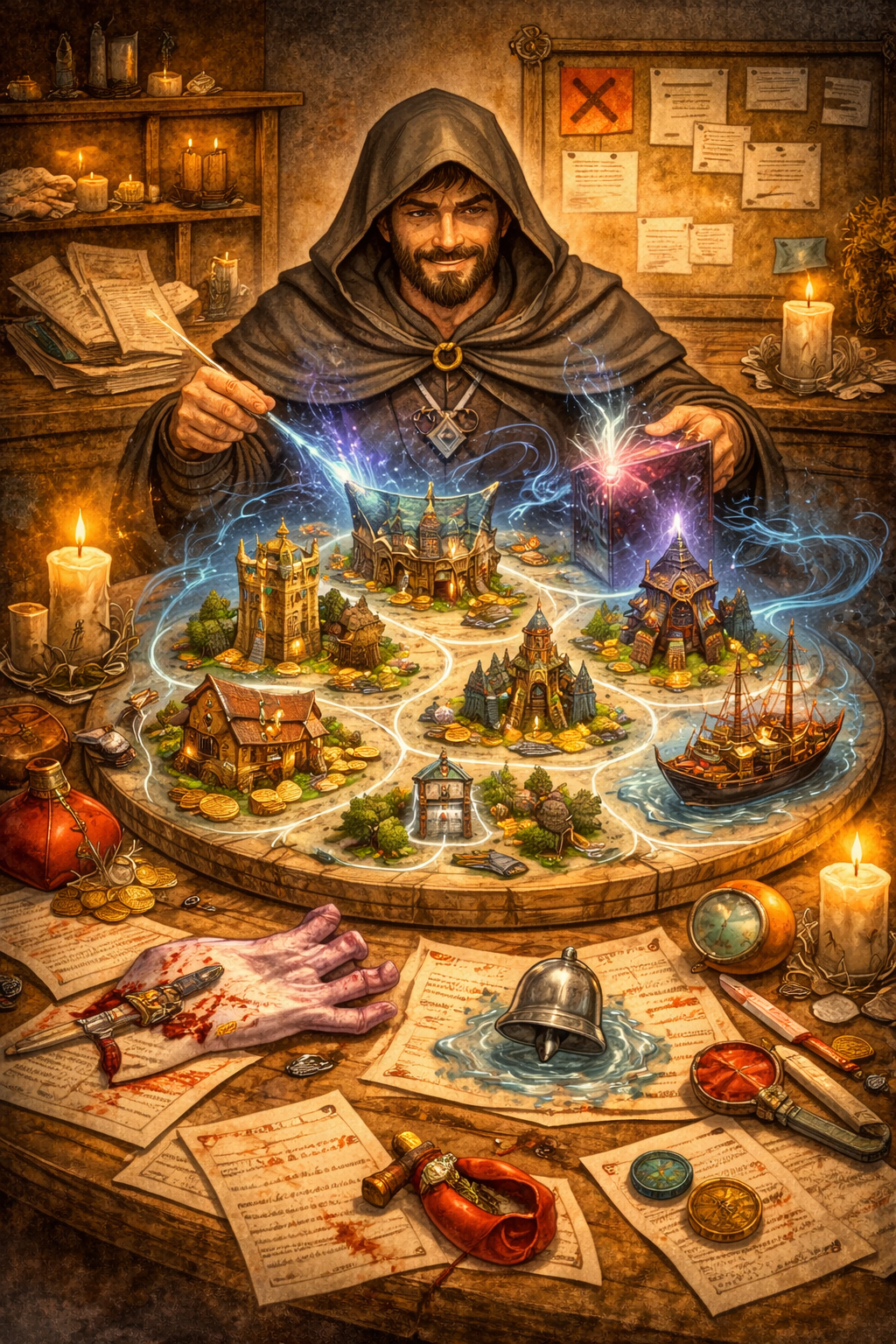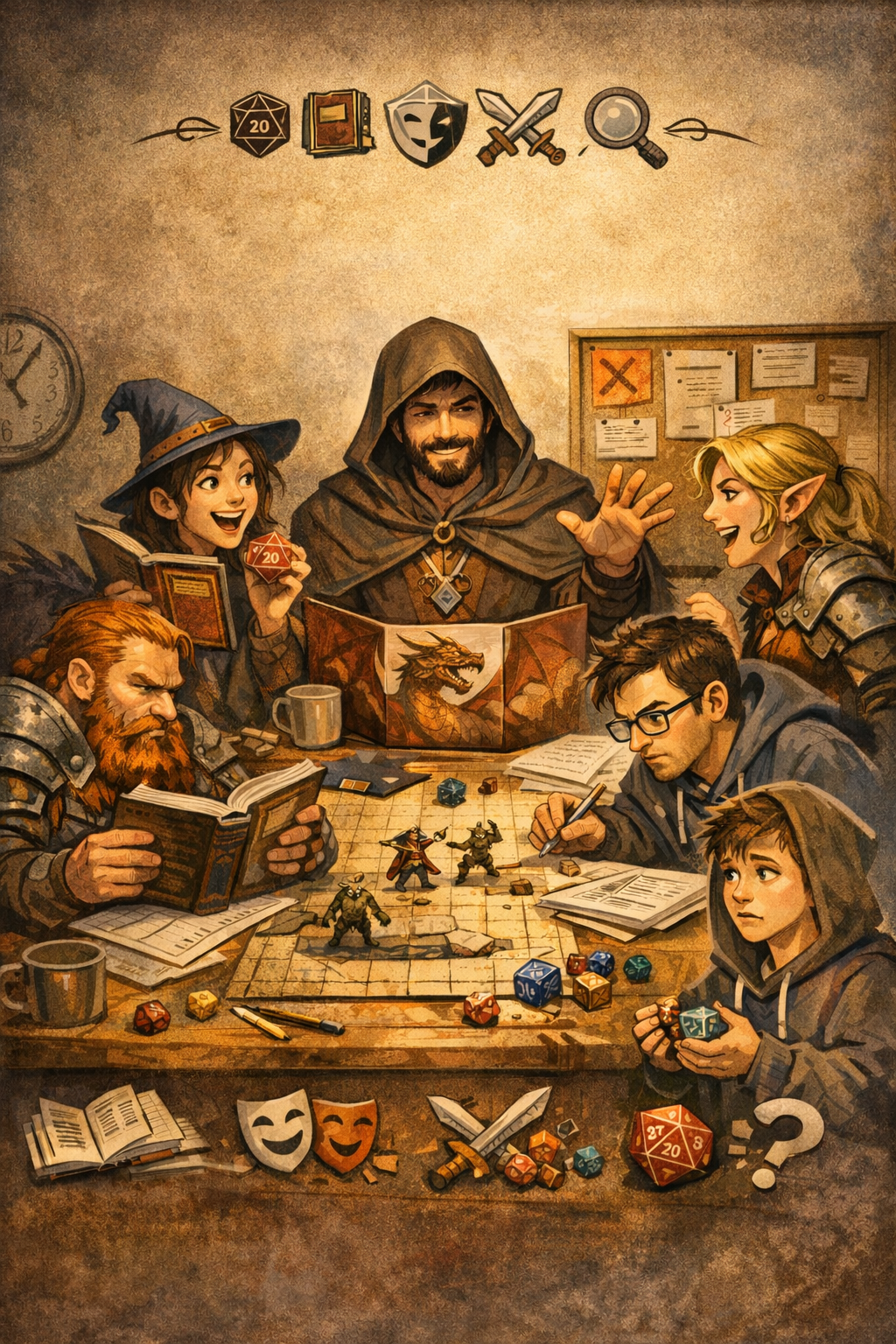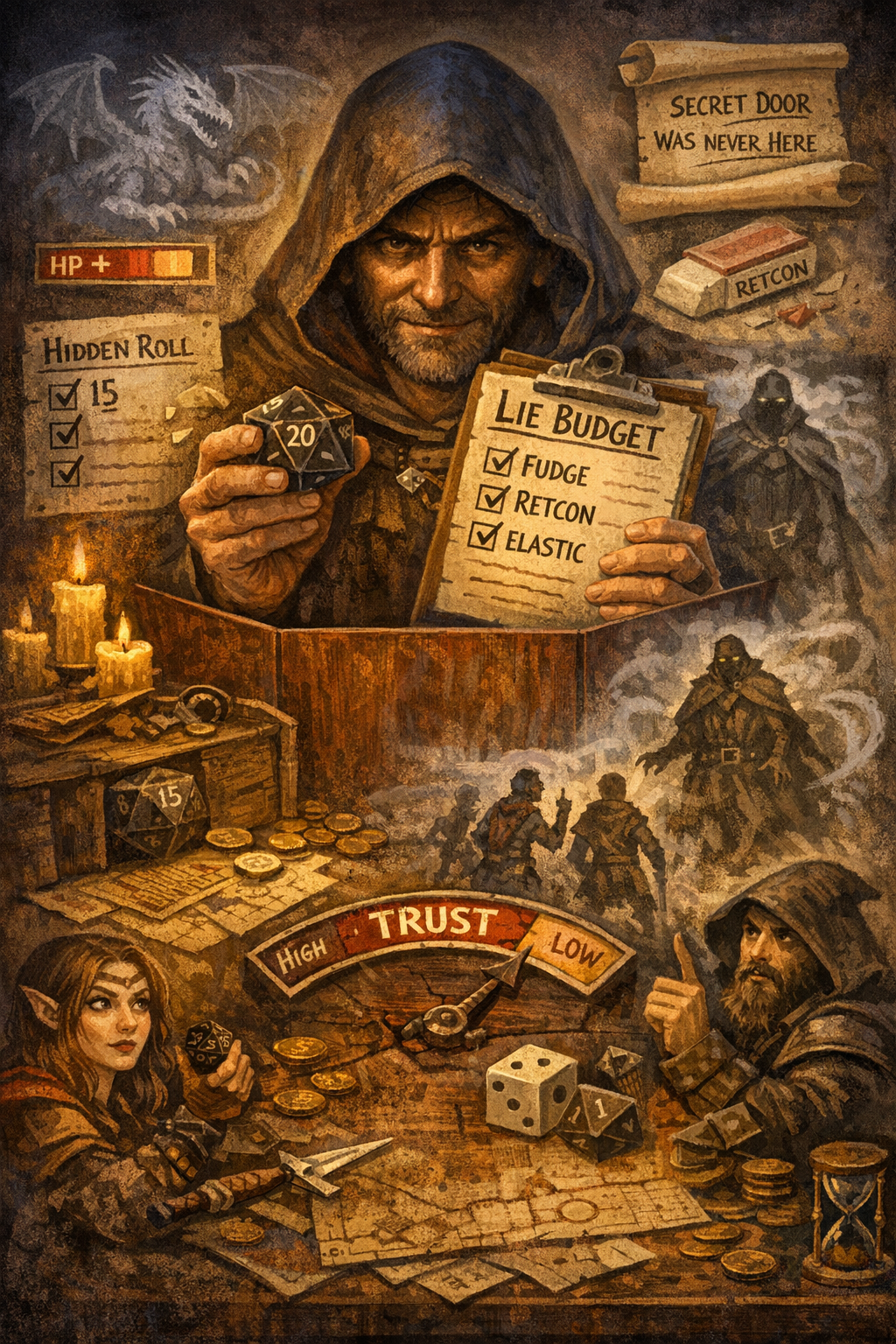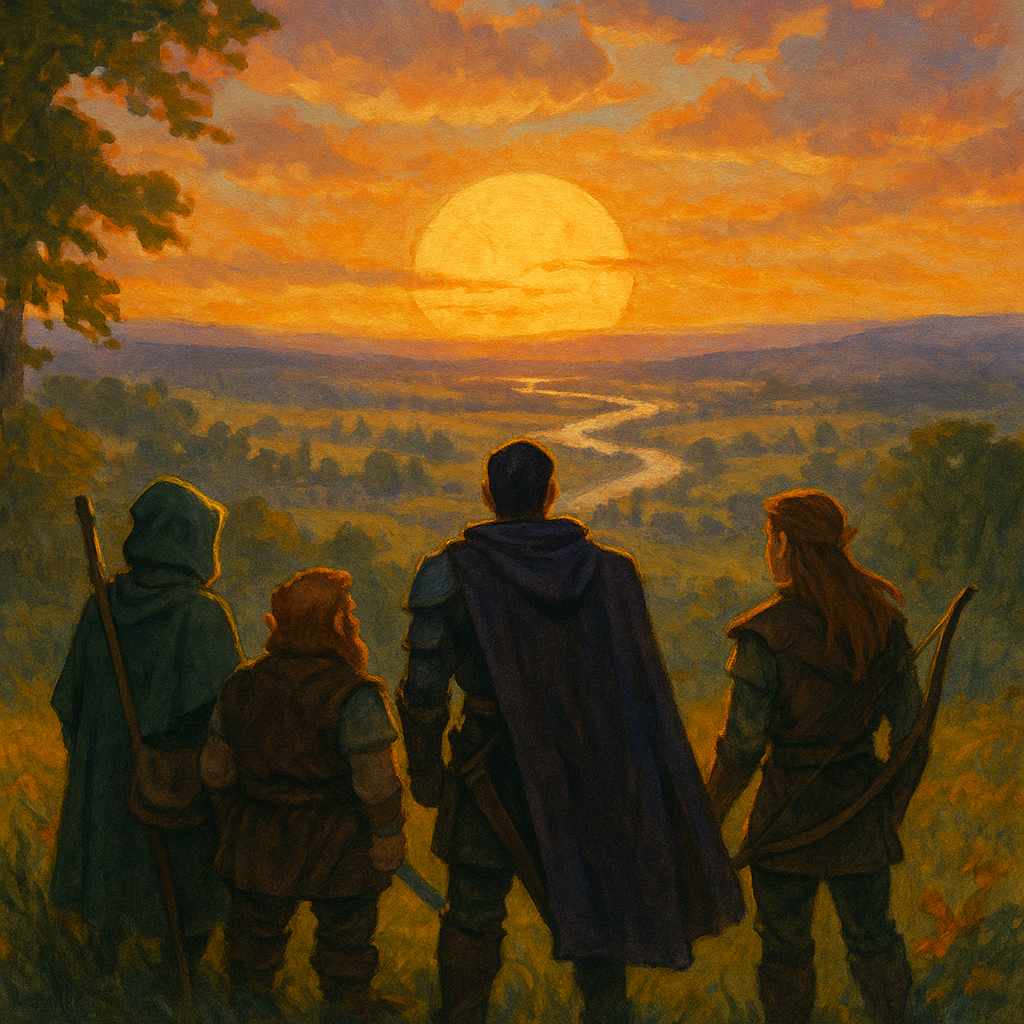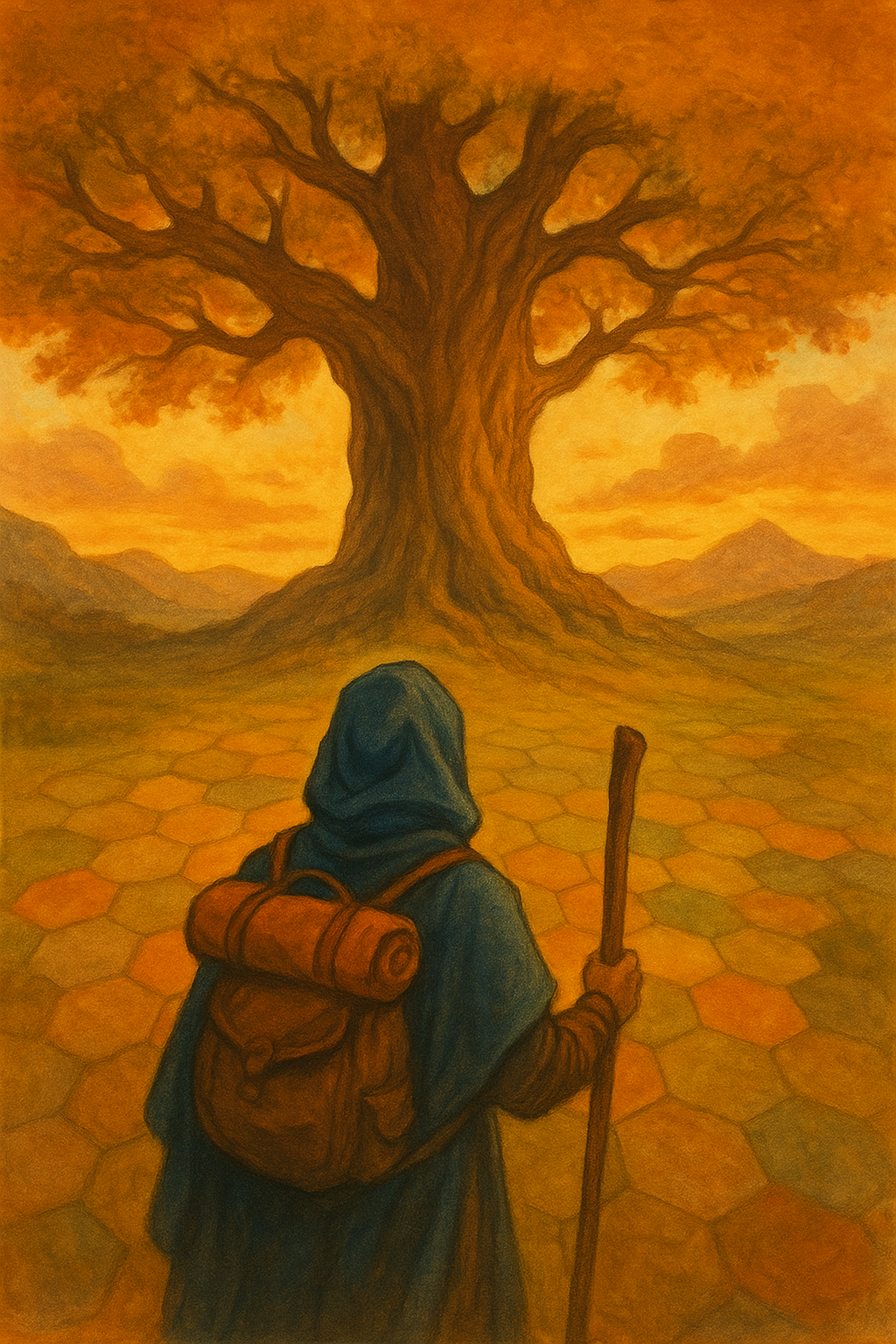The Table is Sacred: Building Rituals That Turn Game Nights into Gatherings
Let's make playing an event not just a thing we do
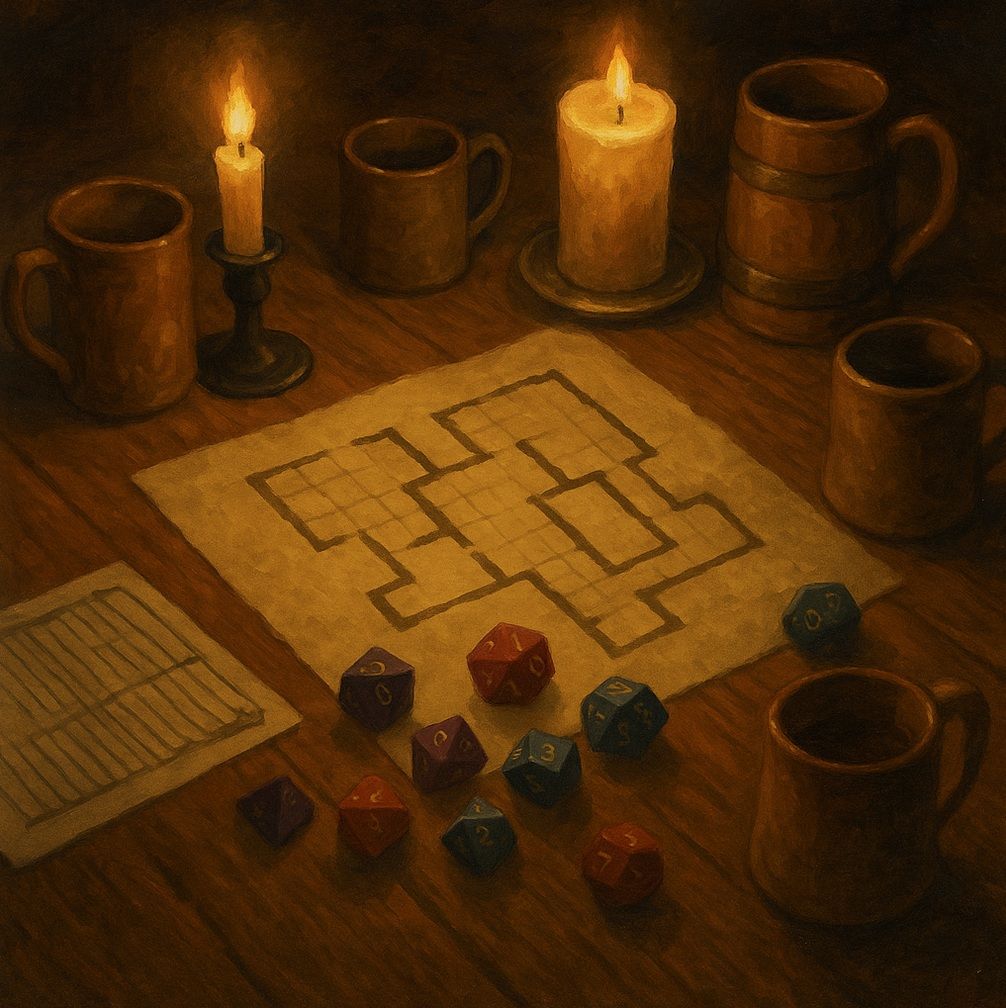
Dear Readers,
Before the first die is rolled, before anyone slips into their character’s voice, there’s a moment — quiet and small — that feels almost electric. You glance around at your friends, snacks on the table, laughter building in the air, and realize that something meaningful is about to happen.
A tabletop game session is more than just a few hours of dice and rules. It’s a gathering of imagination, a ritual of creativity, and a space where people come together to build something that didn’t exist before. Whether you meet in person or online, your table is more than furniture — it’s a stage, a workshop, a circle of storytelling.
Today, let’s explore how to treat your gaming table as something special. We’ll look at the small rituals, habits, and shared traditions that transform your sessions from casual hangouts into memorable, cohesive experiences — moments that linger long after the campaign ends.
Why Rituals Matter
Rituals are about focus and connection. They remind us that what we’re doing — telling stories, laughing, collaborating — matters.
A simple opening phrase, a consistent playlist, or the lighting of a single candle can prepare everyone’s minds to step into another world. These small, repeated actions create boundaries between the ordinary and the imaginative. They say, “This time is for us. This is play, but it’s meaningful.”
Rituals also create memory anchors. Years later, you might not remember every monster you fought, but you’ll remember how it felt when you all sat down, shared food, and heard the familiar line: “Where were we when we last left our heroes?”
Rituals are the rhythm of shared creativity.
The Significance of the Table
The table — whether it’s a polished oak surface, a kitchen counter, or a virtual screen — is where imagination takes form. It’s the gathering point where ideas collide and friendships deepen.
At your table, stories are born, worlds evolve, and characters change. Players become heroes and villains, allies and rivals, explorers and dreamers. It’s not just a setting — it’s a catalyst.
The best tables aren’t just organized; they’re intentional. Every tool, every habit, every small detail contributes to an atmosphere that encourages creativity and trust.
Preparing the Space
Every memorable experience begins with preparation. How you set up your play space affects how your group feels the moment they sit down.
The Physical Table
Clear the clutter. Arrange the dice, snacks, and miniatures. Light a few candles or adjust the lighting for mood. Small details help shift everyone’s mindset from the everyday to the extraordinary.
You’re not just tidying up; you’re creating a stage. Every item on that table tells your players: This is where the story begins.
The Digital Table
For online play, the same principle applies. A consistent background, opening soundtrack, or pinned “session start” message can create structure. Greet players by name. Silence notifications. Make your online space feel just as intentional as an in-person one.
Ritual begins with preparation — with the act of saying, “This time matters.”
The Opening Moment
Every game deserves an opening ritual. It’s the signal that says: we’re beginning.
The Call to Adventure
Start every session with a familiar phrase, like:
“Where were we when we last left our heroes?”
This small question does more than recap the plot. It creates continuity — a thread connecting one week’s story to the next.
A Symbol of Unity
Some groups light a single candle, roll a “table d20,” or place a shared token in the center of the table. It could be a small figure, a trinket from the campaign, or even a favorite die. The act of doing something together — even symbolically — brings everyone into the same mental space.
The Moment of Appreciation
Before diving into the session, take a second to look around and say, “I’m really glad we’re here tonight.” It’s simple, honest, and grounding. It reminds everyone that beyond the game, this is time spent together.
Shared Language and Table Traditions
Every group develops its own dialect — inside jokes, running gags, and phrases that only make sense to those who were there. These bits of language become badges of belonging.
Your Table’s Signature
Find a greeting, chant, or toast that feels right for your group. It doesn’t have to be serious — humor is just as powerful as solemnity. Over time, these repeated moments become part of your group identity.
Closing Phrases
End each session with a consistent line. Maybe it’s, “The story sleeps until next time,” or “Dice down, heroes — see you next week.” Repetition builds connection. It’s a way of saying, we’ll be back.
Music and Mood
Sound sets the tone faster than anything else.
A Theme Song
Give your campaign a theme song. Play it every time you start. It could be orchestral, ambient, or even something your group picked together. The moment that track begins, everyone knows — it’s game time.
The Power of Silence
Not every moment needs music. A deliberate pause before a major roll or during an emotional reveal creates anticipation. Silence can be its own kind of magic.
Food, Fellowship, and Fuel
Food is one of the oldest social rituals in the world. Sharing a meal or snacks before or during play strengthens bonds, reduces tension, and adds warmth to your table.
The Shared Meal
If you can, eat together before you play. It’s a time for laughter, catch-up, and informal connection. It also helps players transition mentally from “daily life” to “adventuring mode.”
Themed Snacks
Some groups love to lean into theme — dwarven ale, elven bread, or just a bowl of pretzels humorously labeled “Dragon Eggs.” Small touches like these spark joy and set the mood.
Dice and Intention
Dice are more than plastic shapes. They’re symbols of chance, trust, and narrative tension.
The Table Roll
At the start of each session, everyone rolls one die together — not for stats, but for energy. Whatever numbers come up become a playful omen for the night’s tone: low rolls mean chaos, high rolls mean confidence.
Dice Blessings (Without the Blessing)
Instead of superstition, treat the act of rolling dice as a collective reset — a way of saying, “Let’s see what story tonight brings.” It’s about embracing uncertainty together.
Mid-Session Pause
Long sessions benefit from a structured break. But instead of treating it as downtime, treat it as a moment to check in.
Ask questions like:
- “What’s been your favorite moment so far tonight?”
- “Is there anything your character is thinking or feeling right now?”
Breaks like this create space for reflection, especially in story-heavy games. They also remind everyone that their engagement matters more than efficiency.
Closing the Session
Endings are as important as beginnings. They give shape to the experience.
The Final Image
Try to end each session on a moment that feels emotionally complete — even if the plot continues. It could be the quiet aftermath of a battle, the image of a rising moon over a ruined city, or the party resting by a fire.
These scenes don’t just close the story; they give your players something to hold onto until next time.
The Table Toast
End each session with a shared toast or cheer — something simple like:
“To stories well told and dice well rolled.”
It’s a reminder that win or lose, what matters is the shared experience.
Reflection and Gratitude
When everyone’s gone or logged off, take a moment yourself. Look at the notes, the dice, the character sheets. Think about the laughter and the story that unfolded.
Reflection helps prevent burnout and deepens your appreciation for the work you’ve done — because it is work. DMing takes energy, patience, and care. Give yourself credit for what you’ve built.
If you like, jot down one line in your journal after each session. Not a recap, but a thought: “Tonight they became a family,” or “The villain won, but it felt right.” Over time, these notes become your personal chronicle of creativity.
Rituals for Online Play
Virtual tables can be just as intimate as in-person ones if you build in structure.
- Start each session with everyone typing or saying a shared phrase in chat.
- Use a consistent “session start” sound or image.
- Have everyone type one word in chat to describe how they feel before and after play.
Small rituals translate beautifully to digital spaces. What matters is intention, not proximity.
Handling Conflict and Resetting Tone
Even the best tables hit rough patches — disagreements, burnout, or tension. Rituals can help smooth those moments too.
Start with a “table reset.” Everyone takes a breath. Maybe roll a neutral die together or crack a small joke. Treat it like hitting a story checkpoint.
The goal isn’t perfection — it’s continuity. When you have rituals, you have a structure that helps your group return to balance.
Celebrating Milestones
Milestones deserve ceremony.
When your campaign reaches a turning point — a year of play, a major level-up, or the end of an arc — pause to celebrate.
- Create small “achievement tokens.”
- Write a short reflection as the DM about how the group has grown.
- Let each player describe one way their character has changed.
Acknowledging progress reinforces that the journey matters as much as the destination.
The Relics of the Table
Every group accumulates physical and emotional mementos — old character sheets, doodled maps, cracked dice. Don’t throw them away. They’re evidence of creativity lived out loud.
Create a box, binder, or digital folder for campaign relics. Label it with the campaign’s name and the dates you played. Bring it out occasionally before a new campaign begins and remember the worlds you’ve built together.
These keepsakes turn fleeting moments into history.
Honoring Absence
When a player can’t attend or needs to step away long-term, acknowledge it gracefully.
Set an empty chair or token in their spot. Let it stand as a reminder that they’re still part of the group’s story, even while away.
When they return, welcome them with enthusiasm. These gestures of continuity strengthen trust and belonging.
The DM’s Role
Dungeon Masters often act as the heartbeat of the table — not because they control the story, but because they maintain its rhythm.
Before each session, take a moment for yourself. Review your notes, breathe deeply, and set your intention:
“Tonight, I’ll help create something worth remembering.”
This quiet preparation isn’t mystical — it’s mindful. It keeps you grounded and ready to lead with openness and creativity.
Building a Culture of Connection
When new players join, teach them your group’s rituals and traditions. Explain not just what you do, but why you do it. Invite them to add their own ideas.
Before long, your table will have its own culture — a blend of habits, humor, and respect that belongs to no one person but to everyone present.
That culture is the real treasure of tabletop gaming.
Showing Up as the Ultimate Ritual
In the end, the most powerful ritual of all is simply showing up. Week after week, choosing to gather, to create, to imagine together — that’s the essence of what makes tabletop games special.
You don’t need elaborate ceremonies or ornate props. Just consistency, kindness, and a willingness to listen.
Every roll, every laugh, every pause carries meaning because it happens together.
So clear the table. Set the lights. Open your notebooks and hearts.
Because what happens at the table — the shared stories, the creative spark, the human connection — that’s what makes this game endure.
Until next time, Dear Readers…















